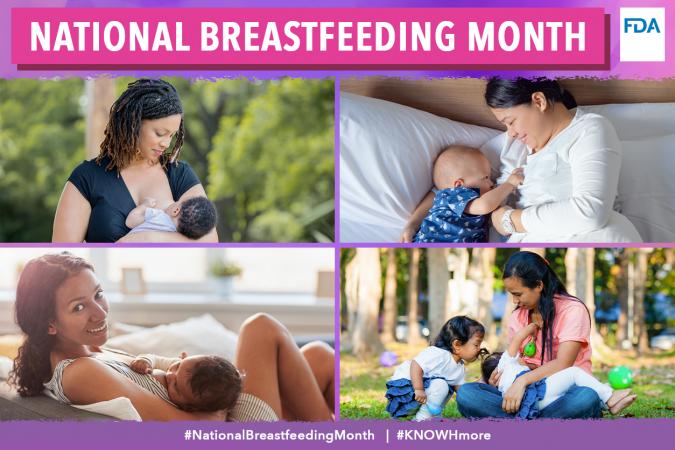Knowledge & News on Women: National Breastfeeding Month
Best Practices for Safe, Healthy Breastfeeding
August 2, 2021
The FDA Office of Women’s Health (OWH) celebrates August as National Breastfeeding Month (NBM) by sharing valuable information and resources with pregnant and breastfeeding moms and their loved ones. While the decision to breastfeed may look different for everyone, it’s important to know the facts - as there are benefits for both mom and baby. If you or someone you know is breastfeeding or thinking about breastfeeding and unsure of the facts versus myths, share this blog post as a guide to help answer commonly asked breastfeeding questions. Read below to help you #KNOWHmore and make informed health decisions for you and your baby.
Why is breastfeeding beneficial for me and my baby?
For most babies, breast milk is the best source of nutrition. Your breast milk will change to meet your baby’s nutritional needs as they grow quickly in their first year. Babies who are breastfed have a lower risk of asthma, obesity, type 1 diabetes, and sudden infant death syndrome (SIDS). Breastfeeding is good for mom too! Mothers who breastfeed have a lower risk of breast cancer, ovarian cancer, type 2 diabetes, and more.
How long should I breastfeed my baby and why?
It’s recommended that babies are exclusively breastfed for about the first 6 months of their life. However, only 1 in 4 babies are exclusively breastfed by the time they are 6 months old. The longer you breastfeed your baby, the more likely they are to be protected from illnesses and have more positive health outcomes as they continue to develop.
What do I need to know before buying a breast pump?
Breast pumps are safe devices that can help you maintain and increase your breast milk supply. Breast pumps can also ease pain by relieving engorged breasts, plugged milk ducts, or pull out flattened or inverted nipples to help your baby latch more easily. There are three different kinds of breast pumps – manual, battery-powered, and electric. Choosing the most suitable pump for your needs can be tricky. What worked well for your mother or friend may not work well for you. Know the facts before you buy, so you can purchase a breast pump that best suits your needs. Visit FDA OWH’s website for more information on choosing a breast pump as well as how to safely use and clean your breast pump.
How should I handle my breast milk?
To ensure safety for you and your baby, always make sure to clean your hands before handling breast milk. If you’re expressing breast milk by hand, wash your hands with soap and water or use an alcohol-based hand sanitizer with at least 60% alcohol. If you’re using a breast pump, check to make sure the pump kit and tubing are clean and that there is no mold in the tubing. If you find mold in the tubing or anywhere else on your pump, throw those parts away and replace them before using your breast pump. For more tips and guidelines, visit here.
What are the safest ways to store my breast milk?
Breast milk can be stored safely in many different ways. Factors, such as, volume, temperature, and cleanliness will affect how long you can store your milk. For safe storage, pour your breast milk in storage bags, or clean food-grade containers made of glass or plastic, tightly sealed with a lid. Always clearly label your breast milk with the date it was expressed so you can keep track of when it will expire. If you’re not sure whether you will use freshly expressed breast milk within 4 days, place it in the freezer to protect its quality. You can find more safe storage tips and guidelines on CDC’s website here.
Is it unsafe to take medications and/or supplements while I breastfeed?
Most medications are actually safe to take while breastfeeding. Although many medications can pass into your breast milk, most of them have little to no effect on your breast milk supply or your baby’s health and wellbeing. Talk with your healthcare provider and your baby’s provider before taking any medications, vitamins, herbs, or over-the-counter supplements while breastfeeding. Your healthcare provider can help you weigh the risks and benefits of taking these medications and/or supplements, based on your health history and current health needs.
Where can I find more resources from FDA OWH to support my breastfeeding decisions?
It’s important that pregnant and breastfeeding moms have access to resources and information they need. The FDA OWH encourages you to #KNOWHmore this National Breastfeeding Month so you can make the best, informed decisions for you and your baby. You can find more breastfeeding resources on FDA OWH’s site here.
You can also visit the following resources below to answer additional questions and support your health decisions. Each of these resources can be easily shared with other pregnant and breastfeeding women, your loved ones, and the women in your community.
Additional Resources for Consumers and Healthcare Providers
- General Breastfeeding Resources: About Breastfeeding, Breastfeeding FAQ, Benefits of Breastfeeding, Why Breastfeeding Matters, Breastfeeding and Nutrition
- Breastfeeding Safety: Proper Storage and Preparation of Breast Milk, Using a Breast Pump, Cleaning a Breast Pump, What to Know When Buying or Using a Breast Pump, Breast Pump and Breastfeeding Resources
- Breastfeeding and Vaccinations: COVID-19 Vaccines While Pregnant or Breastfeeding, Vaccination Safety for Breastfeeding Mothers
- Multicultural Resources: Breastfeeding Myths in the African-American Community, Breastfeeding Guide for Native American and Alaskan Native Families, Finding Breastfeeding Support


